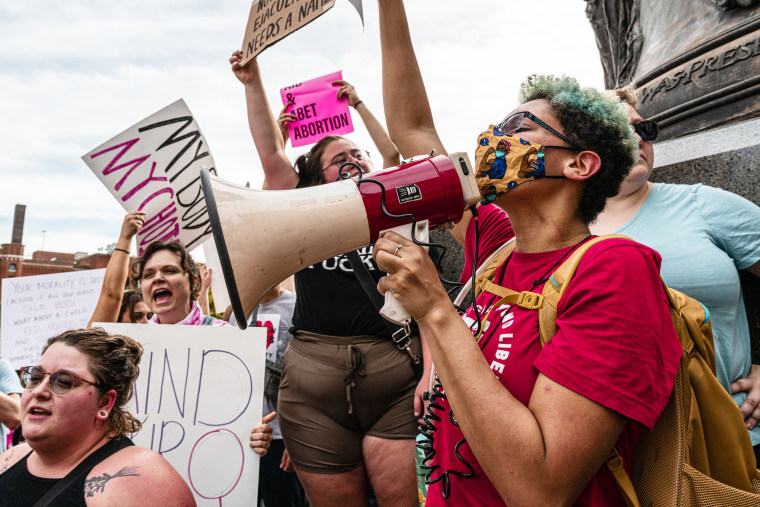Voters in states from across the political spectrum chose to enshrine abortion rights on Tuesday, a major victory for reproductive rights advocates in the first national election since the fall of Roe v. Wade in June.
There were a record number of abortion-related proposals this year, according to the National Conference of State Legislatures: Five states had midterm ballot initiatives, while another, Kansas, voted on a measure over the summer concerning abortion protections.
Voters in Kentucky, a Republican stronghold that has a near-total ban on abortion, rejected an initiative to amend the state constitution to explicitly state that there is no right to an abortion. If approved, it would have made it nearly impossible to legally challenge anti-abortion legislation in Kentucky.
NBC News projections showed that over 52% voted against the measure. While the amendment’s defeat will not change whether Kentucky residents have abortion access if the state Supreme Court continues to allow a ban that is currently being challenged, abortion rights advocates were thrilled by voters’ support.
“Conventional wisdom told us for years that abortion is the most deeply partisan issue, but that’s simply not true,” said Elisabeth Smith, director of state policy and advocacy for the Center for Reproductive Rights. “I think what we see are that Americans across the political spectrum understand abortion to be a liberty issue, and a freedom issue.”
“I think what we see are that Americans across the political spectrum understand abortion to be a liberty issue, and a freedom issue.”
Elisabeth Smith, director of state policy and advocacy for the Center for Reproductive Rights
The Kentucky Supreme Court will hear oral arguments next week on challenges to the abortion restrictions.
In Michigan, voters supported a measure that guarantees the state constitutional right to reproductive freedom, including abortion and contraception. The measure effectively invalidates a 1931 state law that prohibits abortion with no exception for rape or incest; it had been dormant before the Supreme Court struck down the half-century-old decision that guaranteed a federal constitutional right to an abortion.
And in Montana, 52.4% of voters rejected a ballot initiative that would criminalize health care providers if they did not take “reasonable actions” to save an infant born alive, including after an attempted abortion, according to NBC News projections.
Meanwhile, voters in two Democratic states, California and Vermont, chose to officially protect abortion rights in their constitutions. NBC News projected that, as of Wednesday afternoon, 65% of California voters and 76% of Vermont voters supported the measures.
The results come after a slew of states passed anti-abortion legislation following the fall of Roe. More than a dozen states have essentially banned abortion procedures since the Supreme Court’s decision, while others have restricted it.
“There was a lot of talk in this election about, ‘Maybe we need to pay less attention to social issues like abortion. Maybe we need to be paying attention to inflation and the economy and gas prices, etc.’ And I think what voters know is that abortion is an economic issue,” said Grace E. Howard, an assistant professor of justice studies at San Jose State University. “How are you going to raise your children if you can’t afford gas?”
Still, Howard said, “many of us are surprised by some of these outcomes, especially in Kentucky.”
Even more unexpected, Smith said,was that some measures were passed by margins that were not razor-thin. She cited Michigan’s Proposition 3, which 56.4% of voters approved, compared with 43.6% who didn’t.
“We didn’t know what the margins would be, and we didn’t know how quickly we would have the results,” she said.
The wins on Election Day follow a ballot measure in Kansas in August in which voters overwhelmingly rejected a proposed amendment that would have removed protections for reproductive rights in the state’s constitution.
A top concern
Abortion played a major role in midterm voters’ decisions at the ballot box. Along with inflation, Americans cited abortion as the most important issue driving their votes, according to the NBC News Exit Poll.
Democrats said they care most about abortion rights, while Republicans said their biggest concern was inflation, according to the poll. Independent voters also named inflation and abortion as their most important issues.
The results show that ballot initiatives can be a “hugely powerful avenue” for voters who support abortion access to ensure that their voices are heard, particularly if they are in states with anti-abortion legislators, Smith said.
“Until there’s a new federal right, state constitutions are really the best avenue to ensure reproductive rights and abortion rights in any given state,” she said.
The fall of Roe v. Wade may have swayed some voters who previously did not support abortion, Howard said.
“Now they’re seeing what it really means in practice,” she said. “It means that people like themselves could potentially be facing death. They are unable to get the standard of care that they need.”


